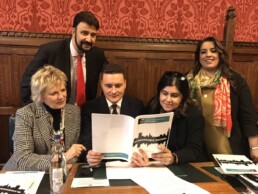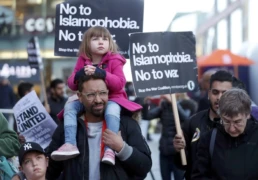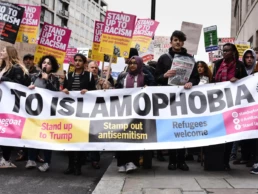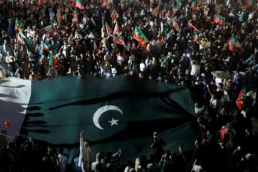Anti-Asian vs anti-Muslim hatred: The Rafiq case
I’d like to point out that this article desperately simplifies a multifaceted issue with intricacies that require unpicking. I envisage many ‘buts’ with rebuttals and counter-arguments. Here I’m simply attempting to start the conversation on anti-Asian vs anti-Muslim hatred. Before I do so, a few important points:
Islamophobia and a working definition: A faith-based perspective
I commend the well-intentioned support of the APPG, and the Muslims who have sincerely wanted to address the issue of anti-Muslim hatred and prejudice. But here I comment on the APPG definition from a faith-based perspective and consider wider ramifications which should not be overlooked by those who believe and are committed to the bigger picture that God wants.
To talk about being a Muslim is to claim subservience to God in the way understood by Abraham and his prophetic descendants all the way to Muhammad, to be informed by God's revealed word and seek to live an honourable life within one's context. What God expects of us is to show appreciation and heartfelt reverence towards Him, to deal righteously with others, and to educate and inform people of the entirety of what God has said.
Islamophobia: Anti-Muslim racism and Muslimness
There is a fundamental question to begin with: what and who does a definition that centres around 'Anti-Muslim racism' and disparaging 'Muslimness' seek to protect and why?
I assert that the paper makes it clear that it wants to protect people of South Asian origin (the who) and their ethnic practices/identity (the what) when they are negatively targeted (the why).
The problem with the term Islamophobia
In this post I begin with the term ‘Islamophobia’ which poses significant problems, both political and religious. As a reminder, the APPG proposed definition goes: “Islamophobia is rooted in racism and is a type of racism that targets expressions of Muslimness or perceived Muslimness.”
The problem with the term ‘Islamophobia’ is:
a) it weakens our ability to robustly deal with anti-Muslim hatred as there is broad societal aversion towards it,
b) it inserts Islam into issues that aren't necessarily faith related. And if the APPG intends this to be about racial hatred then inferring religion by the term "Islamophobia" supports the widespread conflation that Islam is about ethnicity. (I'll deal with point (b) in later posts)
Building back up
For decades (if not a couple of centuries) many Muslim writers, scholars and thinkers have sought to analyse the decline of believers and how to rectify it. Suggestions range from knowledge and ‘religiosity’, to lack of agility or colonialism. I feel that a lot of these are either symptoms or describe the process by which believers got to this situation. But they don’t address the underlying cause. For example, a lack of knowledge might be why people do or think silly things, but knowledge is widely available, in fact, far more available than it has ever been at any time in human history. From one perspective, being a mujhtahid (if we’re talking about Islamic Law), a doctor or an economist today should be a walk in the park in comparison to the past. So saying it’s a lack of knowledge is pointing out the obvious symptom - a constructive analysis would tell us why people would rather remain uninformed, and of course, the ‘why’ is subject to context, place, and culture under scrutiny.
The Taliban and this time around
Given that I advocate a) that believers ought to concentrate on rectifying their own regional affairs rather than assuming that they can somehow save the world to the detriment of their own situation, and b) that we need to re-evaluate the notion of all Muslims everywhere being of equal priority, why am I now commenting on Afghanistan and the Taliban?
Simply put, the last time the Taliban were in power many young people here were left without shar’i-educated and informed voices to offer them substance and clear guidance in how to view things and what to do. What became deeply unfortunate was that this lack of cultivation allowed for the “war on terror” to cause a generation of radicalisation or misplaced priorities in the name of religion. Most became reactionary and were easily provoked along the way to do things that were counter-productive. Of course, the nefarious actions of the US and its allies required staunch opposition, but underlying confusion towards the Taliban’s claims of implementing God's law and our relation to it, misrepresentations by lay imams, and juvenile characterisations of the Taliban built on their visual representations (beards and turbans) had people misconstrue them as prophetic companions!
Well this time around things are very different. Newer generations have much more nuanced thinking. Personally, I now have the moral obligation to do something about it, and having observed the last two decades, I have no desire to go down that path again, nor allow for a future in which my kids have to deal with the same (understandable) shortcomings. Hindsight is great wisdom and we should’ve learned a lot by now: what to do and what not to do. Many Muslims often assume doing the same thing repeatedly will somehow bring about different results - the essence of stupidity - but intelligent people know better.
- The shari'ah
- The Caliphate
- The ummah
- Opposition to foreign policy
These issues have persistently caused confusion for western Muslims, who, driven by riled up emotions come out with all sorts of things, unworkable or absurd. Nearly everything you hear on these issues are uninformed by the actual Law and scripture, and vastly informed by populism, post-colonialism and grievance politics. In the west, political and social strategies lead to behaviour that’s either pointless or ineffective, and frustrations from the resulting failures further entrenches Muslims in their unproductive methods. I think it’d be interesting to see what happens this time around if we press the restart button.
We’re certainly in a different place now, and today’s generations are different (not so sure about the Taliban though!). Times have completely changed and much of this is down to social media. Whilst Muslim millennials are far more cosmopolitan, better politically informed, more socially attuned and carry less immigrant anxieties, many ideas are still inherited because thinking on these issues hasn’t been reformed - and with negative consequences.
Muslims and racist portrayals
(In comment to: 'Deporting ‘foreign criminals’ in the middle of the night doesn’t make us safer')
“Look at modern British history, and you’ll find that the “criminal” and the “immigrant” blur into one another in popular and official thinking. In Victorian England, crime was often blamed on Irish immigrants (“dangerous classes” were labelled with the Irish-derived name “hooligans”), and then on Jews from eastern Europe. These narratives neatly anticipated the way the spectre of “black criminality” was peddled by the press in postwar Britain, as well as contemporary narratives about Muslims and sexual abuse.”
Now the sexual abuse story, in as much as it was inaccurate and absolutely racist, was largely a south Asian story and particularly Pakistani/Kashmiri (please note I’m not legitimising the racist reporting on the issue and the demonisation of an entire ethnicity I neither accept nor condone) but yet somehow it became a Muslim one. How disgusting that sexual abuse and Muslim share the same sentence? And yes whilst I deplore both, for me sexual abuse and Muslim sharing the same sentence is far worse. Yet in the legitimate protest against such framing, there was little demarcation made. Muslim and Pakistani were treated synonymous by both non-Muslims and Asian Muslims.
#MuslimFails
In thinking about #MuslimFails, something I find to be super consistent on a communal level – of course as individuals they can be highly talented and civilised - I've been wondering why #MuslimFails are the norm, with a hope to identify solutions. Across the board Muslims don't do well, and there's always some external excuse: "He did this…she did that…they don't like me."
Whether we like it or not, nothing important is an easy ride and there are always hurdles. God tells us to suck it up, look inwards and take ownership, achieving as much as we can in the constrained environment. Yes, external variables might mean you can only achieve 70% of an objective. But Muslims will achieve 20% (instead of the 70%) and put down the rest to impediments from others. And then they expect the help of God. It is a credal belief of mine that when believers achieve the 70% (or whatever the maximum % possible in a constraining environment) God literally does the rest - do you to your fullest extent and then leave the rest to God: the definition of tawakkul (trust) in practical terms.
The current complaint and reactionary culture is inspired by the devil. How so?
Well, the drive to be productive: being tolerant (flexible and easy to work with), commanding what is right (focusing on positivity), and paying no attention to foolish people (being coldly focused on getting that 70%) is something righteous that the devil despises (Qur'an 7:199). So, he prompts you to emotional reactions and to behave recklessly, to forget the bigger picture and what your own responsibilities are (Qur'an 7:200). You will be asked about what you do, not what they did. So God tells you to seek refuge in Him, not only because God is the supreme helper and protector, but because seeking refuge also reminds you of your priorities and responsibilities to God.
Now Muslims are easily tempted. They’re triggered by the most mundane issues. There are two reasons: 1) lack of cultivation, and more nefariously 2) being riled up and emotionally spiked by their leaders - always in a defensive stance with a village pitchfork mentality. They’re made to believe that everything revolves around them, yet God consistently reminds them of their insignificance, and wider society cares less for what they have to say or complain about. Maybe it’s me, but I find that consistently putting yourself in a situation to be undermined and belittled is quite embarrassing (I’d rather punch myself repeatedly in the face). So rather than look inwards when things clearly aren’t panning out well, they blame ‘outsiders’ even more. The more they fail, the more they blame. Clearly, it’s not a very productive response.
A relatively recent example of this was a debate on social media about the eschatological event on Jesus’ return. Some people erroneously advocated that he certainly won’t be, and many went berserk. Now usually social media tends to stay virtual, but this time I was left fielding questions about it in mosques and after my Friday sermon. It consumed conversation for months, especially when we had far more important things to resolve, and where in reality it’s an insignificant debate. So why were people so crazed?
- Because people are bored. With little going on it provided good religious entertainment and dinner table conversation.
- Because people are obsessed with everyone else - they got to police who’s ‘in’ and ‘out’.
- Because they were told it was disbelief and they worried about a (dis)belief they don’t even have.
Now interestingly, there weren’t many scholars that got involved. It was all bluster between personalities. Scholars (in the context) saw it generally for what it was - the next pitchfork hype. Why isn’t it important? Because righteous action cannot be built on it, and as such it is a talking point. But then the theology police came out and sounding like medieval Catholics they made out like the world would crumble and the masses would deny Jesus and his return if this wasn’t addressed right away. Given that the normative view has lasted around 2000 years, a reasonable person recognises that a couple of personalities on Facebook wouldn’t be a serious challenge. But the amount of energy people put into reading about it, discussing it and arguing (not to mention misunderstanding, mischaracterising, and speaking without knowledge) they could’ve completed a degree in physics. Or learnt Arabic and memorised a third of the Quran.
Another example: Offensive cartoons that intend to represent the final Prophet (obviously they’re not really him).
So, the disbelievers say: “Let’s rile up Muslims so that they’ll do something stupid or behave in a way that undermines their standing even more amongst wider society.”
Muslims openly acknowledging that they’ve realised that this is the intention: “Let’s react recklessly and give the disbelievers what they are after. And yes, we’ll win!” Does anybody on God’s green earth play into the hands of the opposition, fall for their game, and assume that’s a winning strategy?! Can the inanity get anymore surreal?
“But…but…but…it’s the people of kufr who hate us!” Well then why are you acting so surprised? Do you expect anything less nefarious?! Do you expect your antagonists to stroke you and sing songs about how wonderful you are? And if you logically conclude that they’ll repeatedly try to provoke and undermine, where’s your strategy to gain the upper hand in such situations so it backfires for them each and every time?
The saga around the Return debate (and there are many other case studies) exemplifies the uncivilised ways in which impoverished impulses, childishness, and ignorance drives a lot of Muslim public culture. And like kids, when people are easily triggered, they don’t question their own juvenile impulse, they blame what's often an innocuous trigger. When people are told about their behaviour, they blame someone or something else (and often through mischaracterisation). In politics it’s usually the Tories or the right, in society it’s the racists/Islamophobes/kuffar, and on Christ’s return it was the ‘deviants’.
Please.
Believers do not afford anyone but God such levels of power, and they take proactive ownership:
“Those who responded to God and the Messenger after suffering defeat, who do good and remain conscious of God, will have a great reward. Those whose faith only increased when people said, ‘Fear your enemy: they have amassed a great army against you,’ and who replied, ‘God is enough for us: He is the best protector,’ returned with grace and bounty from God; no harm befell them. They pursued God’s good pleasure. God’s favour is great indeed. It is Satan who urges you to fear his followers; do not fear them, but fear Me, if you are true believers.”
Qur'an 3:172-175
"Go back to Pakistan" and the MCB's response
Very recently, Conservative activist Theodora Dickinson tweeted that if Labour shadow minister “Naz Shah hates this country so much why doesn’t she go back to Pakistan?!” This vile show of racism was in response to Shah discussing her experience of poverty. Of course, the foolish Dickinson exposed her racist impulses - here there is no doubt. Neither is there any doubt that Tories have continued to tolerate hatred towards Muslims as well as racism towards minorities.
However, the point of this article is to point out something we’ve highlighted for years, that the public conversation in the UK on Islam is being subsumed under the banner of being Asian, and most notably Pakistani and Bangladeshi. Whilst it's convenient to put this corruption on non-Muslims, the truth is that it’s driven by major Muslim organisations claiming to represent Muslims but who in reality use Islam in politics as a form of ethnic protest. The latest significant example is that of the Muslim Council of Britain (MCB). I am neither picking on the MCB nor do I claim that the organisation doesn't do good things, and here I differentiate between the organisation and its individuals (and the great things they've achieved). This post is about what the organisation stands/speaks for - as an organisation.
Now MCB's response to the Dickinson episode is unsurprising given its advocacy of the British Muslim APPG's definition of Islamophobia which subsumes racism towards Asians as anti-Islam. When I raised this previously, the MCB were quick off the mark to tell me this wouldn't be the case, yet as we suspected, that's exactly how the MCB has functionalised it.
The response of the MCB to the tweet was simple: by the racist Dickinson telling Shah to go to Pakistan (although the UK is her country) she was being Islamophobic. For the MCB, anti-Pakistani racism is anti-Islam - which obviously it’s not - it’s racist. This seemed clear to Shah herself who said, “Over the last few weeks BAME (black, Asian and minority ethnic) communities have been coming to terms with the racism they have faced over the years. In 2020 to be told to go back to Pakistan highlights the level of racism that still exists in some quarters of society.” Note that Shah DIDN’T conflate the episode with Islam.
Pakistani is not Islam and for the MCB to make such a crude conflation says that either it is wilfully appropriating a religious identity for Asian interests, or that it is ignorant of what Islam and Muslim is in which case it has no legitimate claim to representing Muslims and ought to rebrand as the Asian (Muslim) Council of Britain. Please note that the issue here isn’t with being Asian - people are free to celebrate their ethnicities (and we like to join in!), but with how the MCB is diminishing the level of Muslim public discourse in the UK instead of rectifying it and raising it as is the MCB’s moral responsibility. And this issue would equally need to be raised if a mainstreamed Muslim organisation did the same with Somali, Moroccan, Nigerian or Albanian ethnicities.
As believers we are stoutly against racism, xenophobia AND political anti-religious hatred. But we also acknowledge that they’re not all the same thing (although they obviously coalesce in particular situations). And as believers, we must be concerned for the future and how such organisations are feeding into it - the MCB are frequently called upon by the media where it positions itself as a mainstream Muslim organisation but where it actually seems occupied with ethnic rights (obviously admirable in and of itself). And no matter how much we raise the problematic nature of the conflation or call on self-labelled Muslim organisations to be Muslim rather than something else, whether we do so in the open or behind the scenes (which I’ve done for years), the MCB doesn’t seem interested. To be clear, our only interest in this is God’s cause, what it’ll mean to be a believer in the near future for us and our descendants, and our moral obligation to deliver the message. No matter the circumstances THESE will ALWAYS take precedence to the sincere believers. Yet the MCB and other such public organisations seem committed to something else.
The current conflation of ethnicity and religion in the public realm is heinous in God’s eyes. It causes people to believe Islam is an ethnic identity specific to certain groups of people and their culture, rather than a natural (fiṭrī) inclination that enhances ANY culture and historical way of living.
God does not want to undermine British culture in the UK but to maintain it and bring out its best aspects. He wants the British people to be the best they can be, and the final Prophet of God showed us how to constructively situate the sharī’ah in any cultural context. Just as he did with the ancient Arabs, we too are expected to do so amongst us Brits. Calling to God is the believers’ priority, and where there’s a necessary contradiction, the narrative that promotes universal tawhīd (monotheism) and hanīfīyah (Abrahamic subservience) always takes precedence even if it means a negligible injury to ourselves or our ethnic interests.
Selfless commitment to God and His deen is what God calls to, and where we’re having an internal communal dialogue then yes, the matter is clear: “Do people think they will be left alone after saying ‘we believe’ without being put to the test? We tested those who went before them..”
No one ethnicity has more right to the Abrahamic truth than another, yet those deliberately making such conflations suggest otherwise. When believers speak in public then it’s clear: “Who speaks better than someone who calls people to God, does what is right, and says, ‘I am one of those devoted to God’?” (41:33) But not only is this call severely hindered, I believe the Establishment are very happy about it - they love to see a weak and unthreatening cause. The narrative that the MCB assist has meant that people literally tell you that they wouldn’t be Muslim because they don’t want to be Pakistani, or view the true religion of Abraham and the sharī’ah given to Muhammad as simply a foreign culture. Not only has something gone VERY wrong, the failure to actively counter this erroneous narrative demonstrates moral culpability.
Of course, to those who seem to have little knowledge of the final message (the Quran), the obligation of the believers, and the intersection between political theory and public theology, it’s not surprising. So rather than separate the pristine sharī’ah from what taints it (all cultures are fallible with problematic elements), the MCB has been adamant not to do so. The very simple point seems lost on the MCB that you cannot suggest Asian and Muslim are the same thing, but then when Asians do things you don’t like (like in Rotherham) you argue that it’s not a Muslim issue and calling it so is Islamophobic, then you’re clearly not getting the optics.
Allegiance to God and the godly cause, which the MCB seems to conflate with contemporary social justice activism and the interests of the Asian community, compels us to challenge such state of affairs. (Of course, a shar’ī approach includes social justice, but our activism is shaped by shar’ī objectives and variables.) Again, were it not for the damaging consequences of a major organisation in the public eye misrepresenting the Muslim cause, posts like these would be unnecessary. But alas, they stray into territory that necessitates it.
For clarity, here are some of the ways in which this is a grave problem for those committed to the advocacy and spread of Abrahamic monotheism and the sharī’ah (da’wah). It undermines:
- The call to true Abrahamic monotheism free from foreign cultural baggage and an ethnic character
- The basis of a public conversation that starts with revelation rather than defending against ethnic conflations
- The presentation of God’s final word that sits within the British cultural context
- Legitimately locating problematic ethnic attitudes and shar’ī rectification required within ethno-cultural communities
- Actual anti-Muslim hatred face by believers of various heritages
If Dickinson had told a Nigerian/Malaysian to go back to Nigeria/Malaysia, would the MCB have called that Islamophobia? Probably not (and of course, it wouldn’t be). Either Muslim organisations must stop using Islam as a shield for ethnicity-related issues, or we must accept that being a Muslim in the public realm is basically to be ethno-cultural. And if the latter is true then we can't blame believers who'll refuse the Anglicised appellation of 'Muslim' or rail against its misuse. If such organisations refuse to listen or chart a course built on both shar’ī and social knowledge, how long do we go and how perverse must the public discourse on Islam become until we say, “Not in our name?"
Race, Ethnicity and Community: Where do we go?
It’s simplistic to argue that religious spaces need to be inclusive when we factor in that these spaces are less ‘religious’ than they are significantly ethno-cultural and sectarian - intended to protectively maintain an ethnic and denominational environment. Resolving feelings of marginalisation and prejudice won’t simply boil down to addressing anti-blackness and racism in ethno-cultural communities. There’s much more going on and much of it interrelated. Having thought about this issue and how to proceed effectively for a while, and trying out various things on the ground, here are some conclusions which I briefly explain.











